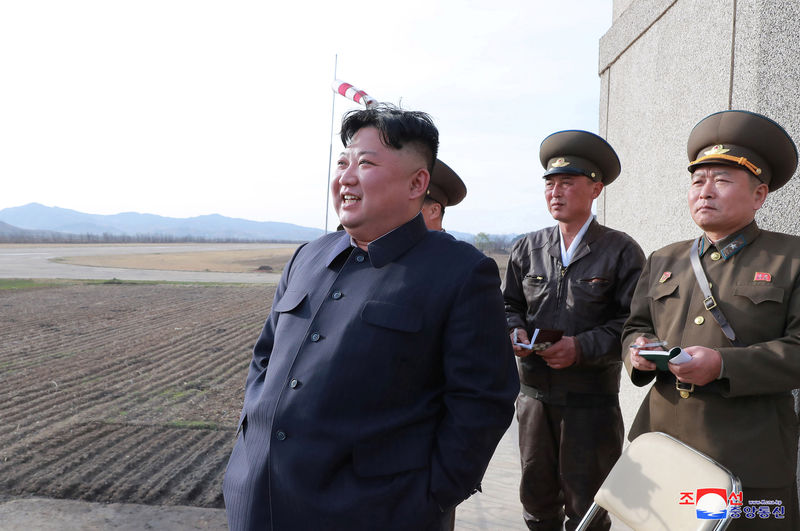By Joyce Lee and David Brunnstrom
SEOUL/WASHINGTON (Reuters) - North Korea said on Thursday it no longer wanted to deal with U.S. Secretary of State Mike Pompeo and that he should be replaced in talks by someone more mature, hours after it announced its first weapons test since nuclear talks broke down.
North Korea's state news agency said Kwon Jong Gun, in charge of U.S. affairs at the foreign ministry, had warned that no one could predict what would happen if Washington did not abandon the "root cause" that compelled Pyongyang to develop nuclear weapons.
The statement came shortly after North Korean leader Kim Jong Un oversaw the test of a new tactical guided weapon, North Korea's first weapon test since a summit between him and Trump broke down in late February.
U.S. officials appeared to play down both developments, with acting U.S. Defense Secretary Patrick Shanahan telling reporters at the Pentagon that while there had been a test, it was "not a ballistic missile."
A spokeswoman for the State Department said it was aware of the report about Pompeo and added: "The United States remains ready to engage North Korea in a constructive negotiation."
Despite the summit breakdown, North Korea had maintained a freeze in nuclear and ballistic missile testing in place since 2017,and Trump has repeatedly pointed to that as an important outcome from a year of engagement with Pyongyang.
Experts said the North Korean moves appeared aimed at dividing Trump from senior officials in the hope of exacting concessions, particularly relief from punishing sanctions.
"Just as this week’s 'tactical weapon' test was a signal to warn Trump that his much-vaunted 'freeze' is in jeopardy, the verbal attack on Pompeo is meant to encourage Trump to ignore his hardline advisers and make a deal with his 'friend' Kim Jong Un," said Daniel Russel, the top U.S diplomat for East Asia until early in Trump's administration.
"As long as the North Koreans believe they can flatter and dupe the U.S. president into making important concessions ... they will resist dealing with less gullible and more demanding subordinate U.S. officials."
KCNA gave no details on the weapon that was tested, but "tactical" implied a short-range weapon rather than the ballistic missiles seen as a threat to the United States.
Kim Dong-yub, a military expert at Seoul's Kyungnam University, said it was likely a short-range cruise missile.
KCNA quoted Kwon as saying that the February summit in Hanoi, the second between the two leaders, showed talks could go wrong "whenever Pompeo pokes his nose in."
"I am afraid that, if Pompeo engages in the talks again, the table will be lousy once again and the talks will become entangled," Kwon said.
'MORE CAREFUL AND MATURE'
"Therefore, even in the case of possible resumption of the dialogue with the United States, I wish our dialogue counterpart would be not Pompeo but other person who is more careful and mature in communicating with us," Kwon added.
Joseph Yun, who served as U.S. special representative for North Korea until last year, said North Korea had long been dubious about Pompeo, seeing him as a hardline conservative skeptical of engagement with North Korea.
He said that while Kwon would have been acting on the highest authority, he was only a mid-level official, so his statements should be "taken with a pinch of salt."
"Pompeo is not frozen out as long as Trump wants him to do the job, and the North Koreans have to live with that," Yun added.
Kim warned last week that the Hanoi breakdown risked reviving tensions and said he was only interested in meeting Trump again if Washington showed more flexibility. He gave a year-end deadline for a change in attitude. [nL3N21U4FK]
Trump has said he is open to another summit with Kim, but his national security adviser, John Bolton, told Bloomberg News on Wednesday there first needed to be "a real indication from North Korea that they've made the strategic decision to give up nuclear weapons."
Despite the summit failure, Kim and Trump have both stressed their good personal relationship, and Adam Mount of the Federation of American Scientists saw North Korea's recent statements as "its latest play .. to sideline U.S. officials to try to speak directly to the president."
"The Trump administration has generally chosen to ignore Pyongyang’s public signals, including escalating signals of displeasure with the negotiations," he said. "So far, North Korea has not walked away from the table, but they also have resisted pressure to make substantive progress on the nuclear question."
Kwon also said the two leaders were on good terms, even as he castigated Pompeo for "fabricated" stories as part of a "publicity stunt." He did not elaborate.
Kwon said Pompeo had made "reckless remarks hurting the dignity of our supreme leadership," apparently referring to his agreeing to the characterization of Kim as a "tyrant" at a U.S. congressional hearing last week.
Kim oversaw the test of an unidentified tactical weapon in November.
He said last April he would stop nuclear tests and launches of intercontinental ballistic missiles because North Korea's nuclear capabilities had been verified, but he has never promised to stop testing all weapons.

Kim's visit to the testing site came after he visited the North Korean Air and Anti-aircraft Force on Tuesday.